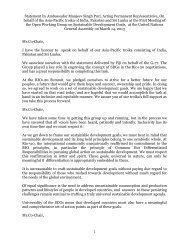STATE OF THE WORLD'S CITIES 2012/2013 Prosperity
STATE OF THE WORLD'S CITIES 2012/2013 Prosperity
STATE OF THE WORLD'S CITIES 2012/2013 Prosperity
Create successful ePaper yourself
Turn your PDF publications into a flip-book with our unique Google optimized e-Paper software.
economic growth is to take place first before equity issues can<br />
be addressed. Although the Consensus promoted pro-poor<br />
growth and the provision of primary education along with<br />
primary health and infrastructure development, it was based<br />
on the premise that poorer sections of society benefit from<br />
whatever ‘trickles through’ the economic and social pyramid,<br />
in an environment of free enterprise and deregulation. The<br />
dramatic collapse of the banking system in major Western<br />
countries in 2008 and the subsequent world economic crisis<br />
has seriously discredited the Consensus approach.<br />
Ample evidence suggests that structures and institutions<br />
are skewed in favour of dominant groups in society. These<br />
groups may legally or otherwise maximise their own<br />
benefits, not by chance but by design, and perpetuate and<br />
enhance conditions that further benefit themselves or their<br />
socio-political class. This is particularly true in cities with<br />
poor governance arrangements, weak institutions and nonexisting<br />
or ineffective planning structures − in other words,<br />
in cities where the ‘hub’ of the wheel of prosperity is not<br />
properly working and fails to steer growth and development<br />
in a more equitable manner.<br />
The UN-Habitat survey on urban prosperity in<br />
developing regions has highlighted corruption as the<br />
greatest barrier to equity, followed by weak civil society<br />
Figure 2.4.2<br />
Factors restricting the scope of greater urban equity<br />
ranking<br />
4.5<br />
4.0<br />
3.5<br />
3.0<br />
2.5<br />
2.0<br />
1.5<br />
1.0<br />
0.5<br />
0<br />
73<br />
Equity and the <strong>Prosperity</strong> of Cities<br />
(with its role in rights advocacy) (Figure 2.4.2). This is<br />
the case in Lahore, Bangalore, Amman and Beirut. In the<br />
survey, local experts also<br />
cited poor governance,<br />
lack of political will<br />
and structural barriers<br />
The impact of<br />
FACT inequity has been<br />
to pro-equity policies<br />
overlooked in conventional<br />
as other significant<br />
economic and development<br />
hindrances to equity. Far<br />
from being a historic or<br />
inevitable phenomenon,<br />
theory.<br />
urban inequality in this<br />
perspective is understood<br />
More equitable<br />
POLICy cities have<br />
to be the result of<br />
greater chances to be more<br />
deliberate negligence,<br />
prosperous; but prosperity<br />
structural obstacles and<br />
does not happen all by itself,<br />
weak capacities to counter<br />
or as a logical consequence<br />
prevailing conditions.<br />
of economic growth.<br />
Historic patterns of inequality Corruption Discriminatory practices<br />
Inef�cient and ineffective government<br />
Lack of democracy<br />
Lack of interest from ruling elites Public institutions controlled by ruling elite<br />
Lack of funds<br />
FACT<br />
While equity has a direct effect on the emergence of<br />
prosperity, it must be brought about through the other<br />
dimensions of prosperity.<br />
Weak civil society to claim or defend rights<br />
Africa Asia LAC Arab States All regions



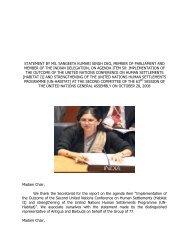
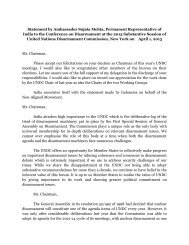

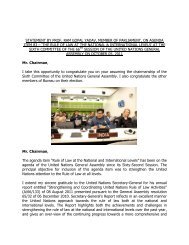
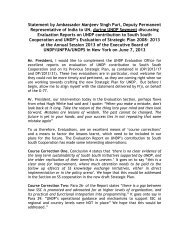



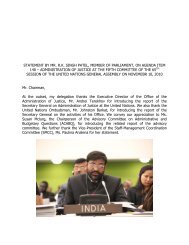
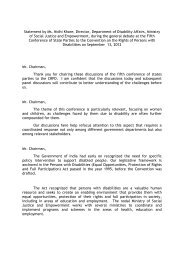
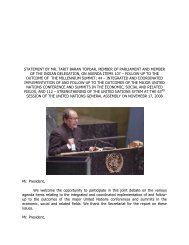
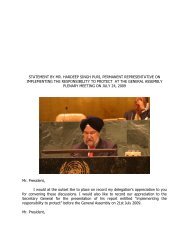
![1 statement by dr.[mrs] kakoli ghosh dastidar - Member States Portal](https://img.yumpu.com/27526598/1/190x245/1-statement-by-drmrs-kakoli-ghosh-dastidar-member-states-portal.jpg?quality=85)
